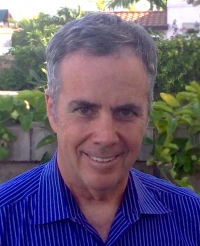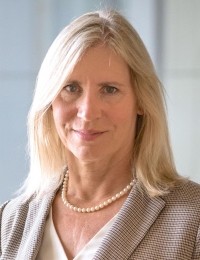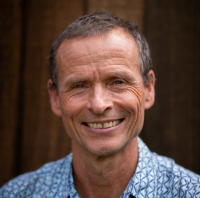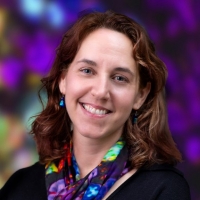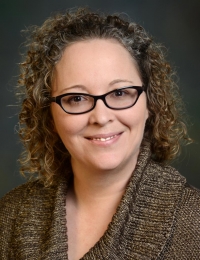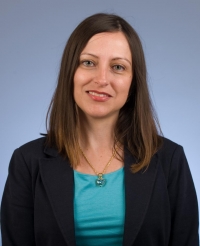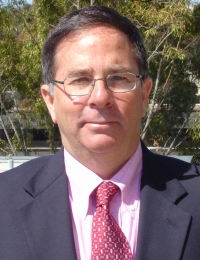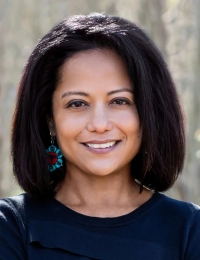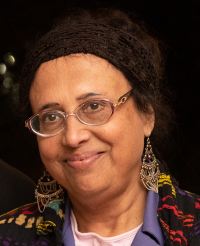Impact of Infectious Disease on Humans & Our Origins
Biographical Sketches: Co-Chairs
UC San Diego
Victor Nizet is a Distinguished Professor and Vice Chair for Basic Research in the Department of Pediatrics, Distinguished Professor of Pharmaceutical Sciences, and Chief of the Division of Host-Microbe Systems & Therapeutics at UC San Diego. Dr. Nizet is a graduate of Reed College, received his medical training at Stanford University School of Medicine, completed a Residency and Chief Residency in Pediatrics at Harvard University's Children's Hospital in Boston, Massachusetts, and a then a Fellowship in Pediatric Infectious Diseases at the University of Washington’s Children's Hospital in Seattle. Dr. Nizet leads a basic and translational research laboratory focused on discovering virulence factors of invasive bacterial pathogens, elucidating mechanisms of host innate immunity, and novel approaches to infectious disease therapy. He is a faculty lead for the initiative for the UCSD Collaborative to Halt Antibiotic-Resistant Microbes (CHARM) which debuted in 2019. Dr. Nizet has authored over 450 peer-reviewed publications and has collaborated with several biotechnology interests in developing new antibiotic and immune-based therapies against drug-resistant pathogens. Dr. Nizet's work has been recognized by career awards from the AHA, ALA, and AAF, the E. Mead Johnson Award for Research in Pediatrics and election to the ASCI, AAP, and AAM. Details of his research program can be found on the laboratory website: http://nizetlab.ucsd.edu
UC San Diego
Elizabeth Ann Winzeler is a Professor at the University of California, San Diego, School of Medicine. She leads a group that uses systematic, data intensive methods to solve problems at the interface of host pathogen biology typically involving large collections of chemical screening data and whole genome sequencing at UC San Diego. She is a fellow of the American Academy in Microbiology. She has published more than 150 publications. She has received awards from the Keck Foundation, the Ellison Medical Foundation, and the Bill and Melinda Gates Foundation. She has received the 2014 Bailey-Ashford Medal, 2017 Medicines of Malaria Venture Project of the year, 2018 Alice and C.C. Wang Award, 2018 William Trager Award, and will receive the 2020 Rady Children’s Hospital Awards of Excellence in Basic Research and the 2020 UCSD Health Sciences Women Leadership Award.
Biographical Sketches: Speakers
UC San Diego
Pascal Gagneux is CARTA's Executive Co-Director, a Professor of Pathology and Anthropology, and the Department Chair of Anthropology at UC San Diego. He is interested in the evolutionary mechanisms responsible for generating and maintaining primate molecular diversity. The Gagneux laboratory studies cell-surface molecules in closely related primates species. His focus is on glycans, the oligosaccharides attached to glycolipids and glycoproteins of the surfaces of every cell and also secreted into the extra-cellular matrix. Gagneux's laboratory is exploring the roles of molecular diversity in protecting populations from pathogens as well as potential consequences for reproductive compatibility. Dr. Gagneux’s interest is in how glycan evolution is shaped by constraints from endogenous biochemistry and exogenous, pathogen-mediated natural selection, but could also have consequences for sexual selection. Dr. Gagneux has studied the behavioral ecology of wild chimpanzees in the Taï Forest, Ivory Coast, population genetics of West African chimpanzees, and differences in sialic acid biology between humans and great apes with special consideration of their differing pathogen regimes. In 2011, while Associate Director of CARTA, Dr. Gagneux helped to establish a graduate specialization in Anthropogeny at UC San Diego. This wholly unique graduate specialization is offered through eight participating graduate programs in the social and natural sciences at UC San Diego.
Salk Institute for Biological Studies
Susan Kaech is a professor and director of the NOMIS Center for Immunobiology and Microbial Pathogenesis (NCIMP) at the Salk Institute for Biological Sciences. She holds the NOMIS Foundation Chair. Kaech is internationally recognized for her efforts to understand how memory T cells are produced during infection and vaccination, how they function and why they can fail to induce long-term immunity during immunization. She and her team have discovered more than half a dozen important regulatory genes, as well as several types of key molecules called cytokines. In addition, Kaech is interested in how T cell behavior is suppressed by tumors; she seeks to use this information in order to create better therapies for cancer using the body’s own immune system—an innovative and rapidly moving field called cancer immunotherapy.
UC San Diego
Amanda L. Lewis, Ph.D. was a trainee at UC San Diego, where she received her doctorate and did postdoctoral training at the interface of microbiology and glycobiology. She started her own lab in 2009 and spent the past 10+ years at Washington University School of Medicine in St. Louis where she is currently an Associate Professor, striking out in new research directions to connect glycobiology and women’s health. Her research program seeks to understand the roles of sialic acids and sialidases in infectious disease and with a particular focus on the vaginal microbiome and urogenital pathogenesis. Her accomplishments have been recognized by faculty career awards from the American Heart Foundation, the March of Dimes, the International Glycoconjugate Organization and the Burroughs Wellcome Fund. Most recently, she was recognized as a Distinguished Investigator by Washington University. A native of California, in 2020, Amanda returned to UC San Diego as a Professor in the Department of Obstetrics, Gynecology, and Reproductive Sciences. Her research program continues to unravel how microbial characteristics unique to the human reproductive tract conspire to cause diseases that threaten the health and lives of women and their offspring.
UC San Diego
Manuela Raffatellu is a Professor in the Department of Pediatrics at the University of California, San Diego School of Medicine. She received her M.D. at the University of Sassari, Italy, in 2000, then joined the laboratory of Dr. Andreas Bäumler as a postdoctoral fellow in 2002, first at Texas A&M University and then at the University of California, Davis. She started her own lab at the University of California, Irvine in 2008, then relocated to the University of California, San Diego in 2017. Her research focuses on Salmonella interaction with the mucosal immune response in the inflamed gut and with the intestinal microbiota. She is the recipient of several awards, including the IDSA ERF/NFID Astellas Young Investigator Award, the ICAAC Young Investigator Award from the American Society for Microbiology, and the Burroughs Wellcome Funds Investigator in the Pathogenesis of Infectious Disease Award.
UC San Diego School of Medicine
Dr. Schooley currently serves as Professor of Medicine and Senior Director of International Initiatives at the University of California San Diego. He completed medical school and an internal medicine residency at Johns Hopkins and infectious disease fellowships at the NIH and Massachusetts General Hospital. He joined the faculty of Harvard Medical School in 1981. His research efforts are directed at the pathogenesis and therapy of RNA virus infections. Over the past several years, he has become interested in the use of viruses as therapeutic agents – namely the use of bacteriophages to treat multidrug resistant bacterial infections.
He became Head of the Division of Infectious Diseases at the University of Colorado in 1990. He led the NIH’s AIDS Clinical Trials Group (ACTG) from 1995 until 2002 during which time the ACTG performed many of the seminal studies that defined modern antiretroviral chemotherapy. He then led the ACTG in its expansion from a domestic US research operation into one with a global reach. He was recruited to the University of California San Diego and served as Head of UCSD’s Infectious Diseases Division until 2017. He now serves as Senior Director of International Initiatives for the University of California San Diego.
La Jolla Institute for Immunology
Dr. Sujan Shresta is an Associate Professor in the Center for Infectious Disease and Vaccine Research at La Jolla Institute for Immunology. Dr. Shresta is an internationally recognized expert on dengue and Zika viruses. Her team developed a variety of mouse models of dengue and Zika infections that mimic epidemiological scenarios, allowing scientists to learn how these viruses spread, how the immune system reacts, and most importantly, to test vaccine and drug candidates that can treat diseases caused by these viruses. Dr. Shresta obtained her B.A. in Biological Sciences from Smith College and Ph.D. in Immunology from Washington University in St. Louis, and completed her post-doctoral training in Virology at the University of California, Berkeley, before joining LJI in 2005.
UC San Diego School of Medicine
Nissi Varki is Professor of Pathology at UC San Diego. She obtained her primary medical degree at Christian Medical College, Vellore, India, one of the foremost medical institutions in South-East Asia, and became US Board Certified in Anatomic and Clinical Pathology, following pathology residencies at Creighton University, Omaha, Nebraska, and St. Louis, Missouri. She went on to acquire postdoctoral training in tumor immunology, first at Washington University in St. Louis, and then at the Research Institute of Scripps Clinic in San Diego. After a short stint on the faculty in the Department of Pathology at UCLA, she moved to UCSD in 1985. After of period of NIH-funded basic research on the mechanisms of cancer metastasis, she started up four histopathology core laboratories at UCSD, helping investigators analyze normal and diseased tissues, particularly those from genetically altered mice. Dr. Varki serves on the School of Medicine Recruitment and Admissions Executive Committee and teaches sophomore medical students. She also teaches immunohistochemistry and histopathology to medical and graduate postdoctoral fellows, and helps students attain histotechnology certification. She also teaches an elective course for graduate and medical students entitled "Practical Histopathology in Mouse Models of Human Disease." In recent years, she has focused her expertise in immunohistology and pathology towards comparisons of humans and great apes, our closest evolutionary cousins, discovering several differences that of are of known or potential biomedical importance.
